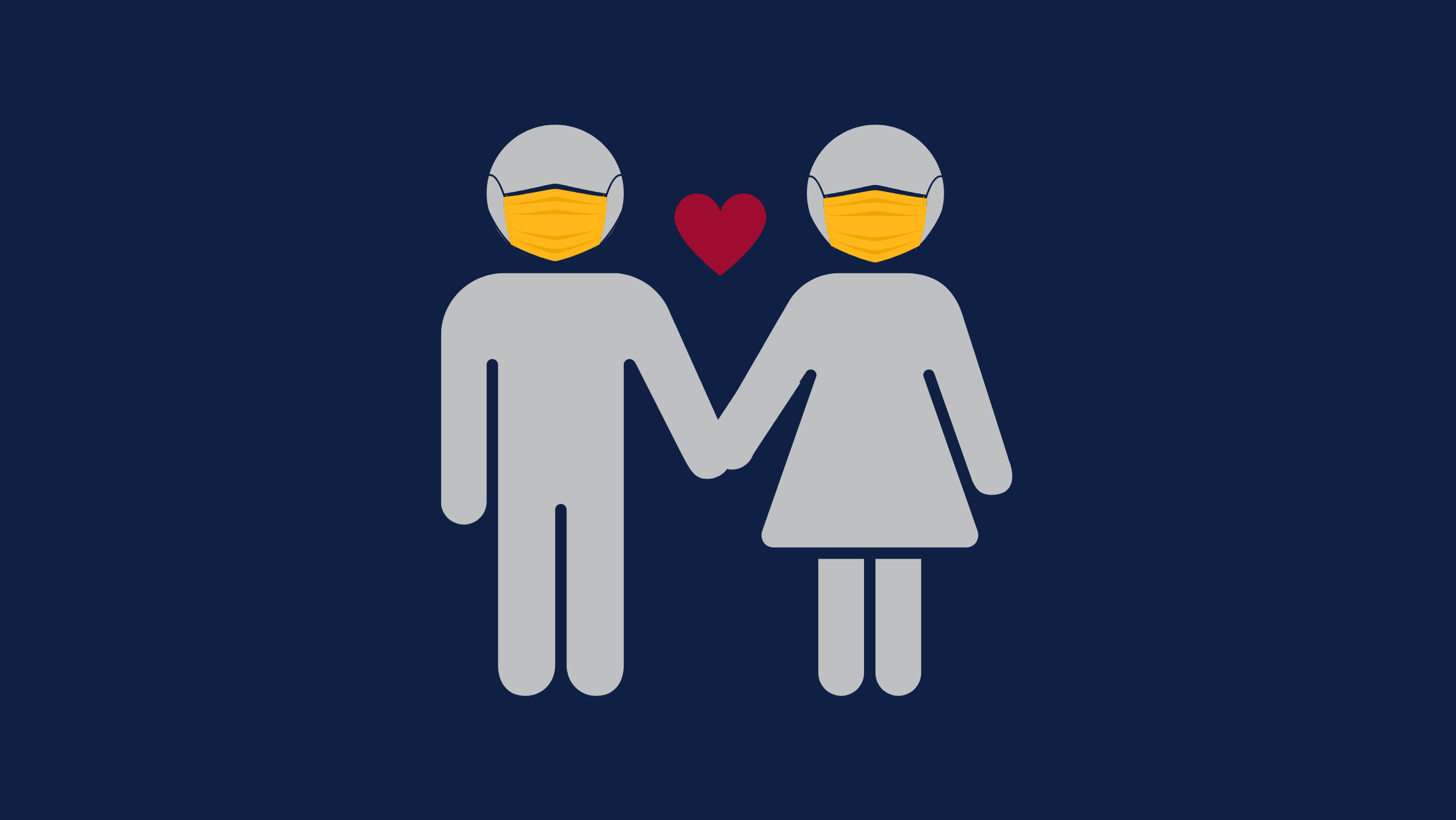

Romantic walks from six feet apart. Virtual dinner dates lit by the blue glow of a computer screen. Swiping endlessly on a dating app, getting a match, and asking the dealbreaker question: “Are you vaccinated?”
The pandemic has affected nearly every aspect of our lives, and romantic relationships are certainly not immune to that. Since March of 2020, some relationships have been strengthened by the challenges of COVID-19, while others have been torn apart. Some singles changed the way they navigated dating completely, and for many, this has led to more meaningful relationships.
How has the pandemic changed the dating landscape and will its effects survive in a post-pandemic world?
Dr. Arielle Kuperberg, associate professor in the Dept. of Sociology, breaks these shifts down in the Q&A below.
Kuperberg’s research focuses on romantic partnerships, especially cohabitation, marriage, college hookups, and dates. Her past research has examined how behavior changes when cohabiters get married, whether cohabitation is related to divorce, where students meet hookup and date partners, and how meeting contexts influence risk-taking.
What have been the biggest shifts in dating culture since the start of the pandemic?
People are being more intentional when it comes to dating. When I compare survey results from a study I did among college students in 2017 and 2021, I see a significant decline in casual dating – it’s about a third less common than it used to be. Because of this – and the fact that it is harder than ever to meet new people – there are more single people.
In addition to it being more difficult to meet people, I think a reason people are being more intentional about dating is that everything in the world is so uncertain and serious, including dating. You can’t casually meet someone for drinks anymore without vetting this person and weighing the risks – who have they been exposed to? Are they vaccinated?
It all boils down to the risk-taking involved in hookups and dates. The research says you take risks because there is a potential reward, and then you weigh these risks versus rewards. As people go longer and longer without a romantic connection or hookup, the rewards of finally going out on a date or meeting up with someone increase – especially if you’ve been socially isolated and deprived for so long.
And with such high risk, it makes sense to pursue a more serious connection than a one-time fling.
So what does dating look like in the pandemic?
Before the pandemic, most people were meeting in class, at the bar, at a party, or some kind of organized activity. Well, the pandemic shut down or disrupted most of the traditional places where people meet.
I think there’s an increase in people participating in online dating, but that opens up a lot of nuances for potential relationships. Online dating plays into this practice of risk-taking and social distancing – not the kind of social distancing we’re used to now, but in the context of how many acquaintances you have in common with this person. If you meet online, you might not have any mutual acquaintances. But if you meet in class, you both know a good amount of the same people. People tend to take more risks with people when they have mutual acquaintances. But this could lead to a false sense of security if they think, “Oh, we both go to UNCG where students either have to be vaccinated or regularly tested, so I can hook up with this person with minimal risk.”
But we are seeing that some college students are feeling like hooking up and dating is part of the college experience, and COVID-19 deprived them of that. As the pandemic wears on, and more students get closer to graduating without experiencing a “normal” year, we see more students willing to take the risk to get that experience before it’s too late.
Are there relationships that are being strained by the challenges of the pandemic?
In one of my studies, we found that 1 out of 10 students experienced a breakup specifically because of COVID-19 disagreements or stress related to COVID-19. I think what’s causing this is a lot of people have very strong feelings about COVID-related things, like how cautious they are, the amount of risk they are willing to take, vaccines, masks, and so on. If your partner is not on the same page, that can cause irrevocable damage to relationships – even relationships that were strong before the pandemic. You couldn’t have predicted how your partner would theoretically react to a global pandemic.
And how has the pandemic brought people closer than ever before to foster meaningful relationships?
I think in some ways the pandemic brought people in relationships closer together because everybody in the world has now essentially gone through the same traumatic experience, which sounds bad, but it’s something to talk about that’s not the weather!
Some people moved up their timelines on moving in together or marriage because they either needed social interaction or because they were just uncertain about the future and wanted to make that commitment now. I think facing this kind of weird, life-or-death situation where you’re in survival mode could also make you cling to the people around you – even if they aren’t the best fit for a long-term relationship, they are what you need for social survival at this moment.
When you look at fiction, there are all these stories about people getting together during the war and then breaking up once the war is over. That’s very realistic – people get closer to the people who are closest to them during crises. I don’t think it’s a bad thing – some people find their lifelong partners that way. For others, I think once this is all over, they may take a step back and reassess their relationship and their partner – was there anything I overlooked at the beginning of the relationship that has turned out to be a bigger deal than I thought now that we’re out of the pandemic?
Will any of these shifts outlast the pandemic? Will COVID-19 change the way we date forever?
After the Spanish flu, which I’m reading about right now for my “Population Problems” course, there was the “Roaring 20s.” People would dress up, go to a dance hall, drink illegally, and hook up with people. That was really the start of hookup culture – it was in response to the Spanish flu pandemic where everything was shut down and everyone was locked in for two years. So, we could potentially have our own version of a post-pandemic “Roaring 20s.”
What is your tip for successful dating in the pandemic?
Start with a Zoom date, and make sure you are transparent upfront about your vaccination status and COVID-19 comfortability to filter out that initial risk. Then, the next couple of dates can be somewhere outside and social-distanced. If those go well, you can think about going back to someone’s place. Balance the risks and do what’s most comfortable for you.
Interview by Alexandra McQueen, University Communications


